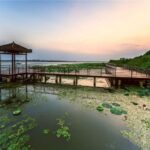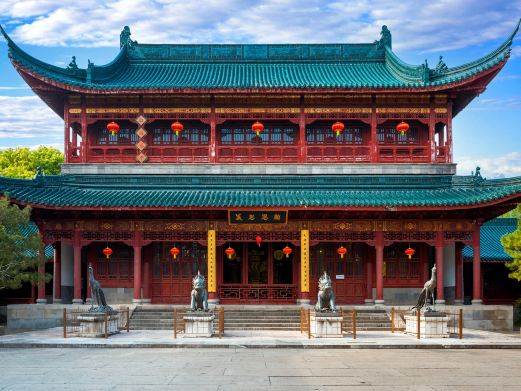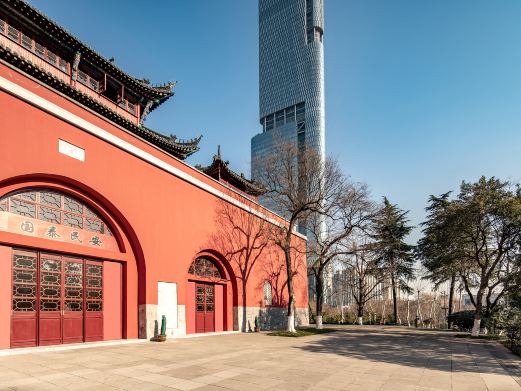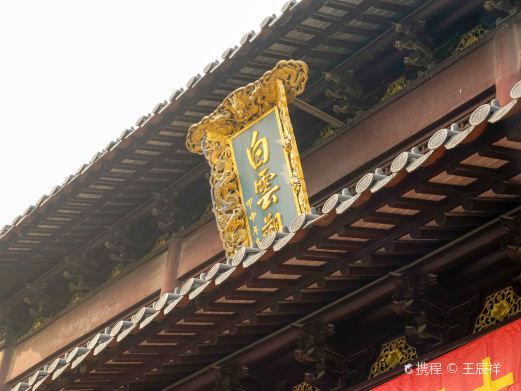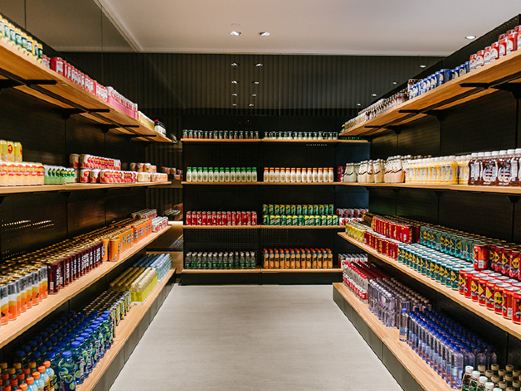Lu Xiang Ancient Village is located on the west side of the Dongshan Peninsula, which extends into Taihu Lake, adjacent to the lake. It is the hometown of the Prime Minister Wang Ao during the Zhengde period of the Ming Dynasty. The TV series ‘Oranges are Red’ filmed scenes on the hills behind the village. The ancient village receives few tourists, with meandering stone-paved alleys and numerous Ming and Qing Dynasty buildings that serve as scenic spots, each with beautiful Suzhou-style small gardens.
The loquat and orange trees planted by every household bring seasonal fruits, and the Taihu Lake delicacies are not to be missed. Several early morning eateries on the main street, Zi Shi Street, open early, where you can enjoy a bowl of Suzhou noodles and purchase special local products such as white jade cakes. For a full meal, tasting the ‘Three Whites of Taihu’ – whitefish, whitebait, and white shrimp at the agritourism restaurants is a must, and in autumn, you can enjoy Taihu hairy crabs. Among the green products available all year round, the Biluochun tea in April, loquats in May, and oranges in autumn are particularly famous. However, do not pick the villagers’ fruits without permission; you can purchase them directly from the villagers. Although the ancient village is quite large, the main attractions are concentrated along the relatively short Zi Shi Street and its adjacent alleys. Between the north and south entrances, there is the Lu Xiang Community Museum Center. The north entrance, marked by an archway, is the main gate. Upon entering the village, you will see a pond, and turning left will lead you to the waterside pavilion ‘Han Gu Du’. Following the signs, you will reach Zi Shi Street. The three archways from the Ming Dynasty, built to commemorate Wang Ao’s successive top rankings in the imperial examinations, stand on the street and are the village’s iconic structures. The village exudes a rich living atmosphere; in the morning, you can see vendors selling vegetables under the archway of the imperial examination. The day for tourists in the ancient village truly begins when the vendors switch to selling Taihu Lake delicacies. Huai De Hall and Huai Gu Hall are both located on Zi Shi Street. Huai De Hall also serves as a folk collection museum, a small residence filled with antiques collected from various places, and a miniature garden where engraved stone slabs are used as steps. Huai Gu Hall features exquisite carvings on doors and windows, and the private garden Li Yuan is delightful, with a nine-dragon screen in the rear building. Wang Ao’s former residence, Hui He Hall, is located in Wen Ning Lane, south of Huai Gu Hall, and is one of the largest residences in the village, complete with a book tower, private school, and kitchen, with beautiful gardens at the end of the central axis and on the west side. At the other end of the alley behind Hui He Hall is Cui He Hall, where you can see the brick carving gate tower, although it may not always be open. In Kang Zhuang Lane, south of Wen Ning Lane, is Sui Gao Hall (Dongting Business Guild Exhibition Hall). Bao Jian Hall in the southern alley provides accommodation, though it is not cheap. The symmetrically laid out Meng Yuan and Hui Yuan gardens are highlights. From the steps next to Han Gu Du, you can climb the hill to overlook Lu Xiang Ancient Village, and in the evening, you can go to Taihu Fishing Village opposite the ancient village to watch the port’s fishing boats and the sunset on Taihu Lake. Open all year round from 08:30 to 17:00; open from 08:30 to 16:30 for preferential policies. Children: under 6 years old (including 6 years old) or with a height of 1. 3 meters (including 1.3 meters) are eligible for free entry.
Children under 4 meters (including 1.4 meters) can enter for free with valid identification. Free for the elderly: People aged 70 years old and above (including 70 years old) can enter for free with valid identification. Half-price for the elderly: Elderly people aged 60 years old (including 60 years old) to 70 years old (excluding 70 years old) can enjoy half-price tickets with valid identification.
Half-price for children and students: Minors aged 6 years old (excluding 6 years old) to 18 years old (including 18 years old) and full-time undergraduate and below students can enjoy half-price tickets with valid identification. Free for military personnel: Active-duty military personnel and retired military cadres of the People’s Republic of China can enter for free with valid identification. Free for the disabled: Disabled people and one accompanying person of severely disabled people can enter for free with valid identification. Supplementary note: The above information is for reference only. The specific information is subject to the notice of the scenic spot. Must-see tips: Since Luxiang Ancient Village is at the midpoint of the Dongshan loop, it is very suitable as a stopover. There are many farmhouse inns in the village. When making a reservation, remember to ask the boss first whether you can get discounts on tickets. You need to buy a ticket when entering the village. Generally speaking, you can enter the village for free if led by the boss, but you still need to show your ticket when visiting various private houses in the village. It is recommended to buy a ticket. If you don’t visit the small scenic spots, you may think that Luxiang is just an ordinary ancient village.





